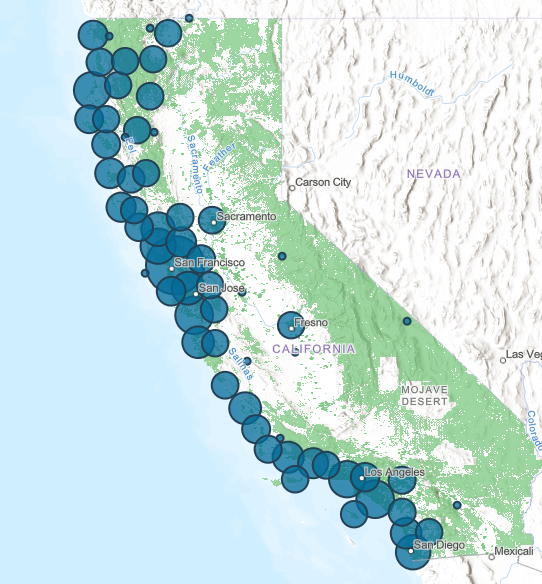Tribal Consultation Policy
State Coastal Conservancy
9/14/2015
Introduction
On September 19, 2011, Governor Brown issued Executive Order B-10-11, which provides, among other things, that it is the policy of the administration that every state agency and department subject to executive control implement effective government-to-government consultation with California Indian Tribes (“tribes”). The State Coastal Conservancy (“the Conservancy”) is an agency within the California Natural Resources Agency and has prepared this consultation policy consistent with the Natural Resources Agency’s policy adopted on November 20, 2012.
The Conservancy is charged under Division 21 of the Public Resources Code with preserving, protecting, and enhancing the California coast and the nine-county San Francisco Bay area. California Indian tribes have sovereign authority over their members and territories, and a unique relationship with California’s natural resources. Tribes and tribal communities have distinct cultural, spiritual, environmental, economic and public health interests, and traditional cultural knowledge about California resources.
The purpose of this policy is to ensure effective government-to-government consultation between the Conservancy and tribes and tribal communities regarding the development of policies, programs, projects, plans, property decisions, and activities (collectively, “activities”) that may affect tribal communities. The goal is to promote discussion and consideration of the views of tribes and tribal communities in an effort to resolve concerns of as many parties as possible.
Process
The Conservancy will seek to identify California Indian tribes that may be affected by Conservancy activities, and to consult with the affected tribes at a time that allows a reasonable opportunity for tribes to comment and participate. The Conservancy will utilize the contact list from the Governor’s Tribal Advisor for federally recognized tribes and the Native American Heritage Commission contact list for non-federally recognized tribes. The Conservancy will seek to disseminate public documents, notices, and information relevant to its activities to affected tribes. Notices will be designed to include sufficient detail of the topic to be discussed to allow tribal leaders an opportunity to fully engage. The Conservancy will identify agency staff, including decision-makers, associated with the activity in question, who can ensure that tribal concerns will be considered.
The Conservancy will seek to conduct meetings, outreach, and workshops at times and locations that facilitate tribal participation. The Conservancy will request information from tribes when conducting research or studies that pertain to or could affect tribal lands or cultural resources. The Conservancy will seek to protect confidential information provided by a tribe, recognizing that the Conservancy is subject to the California Public Records Act.
The Conservancy has designated a tribal liaison to serve as the main contact for tribes. The tribal liaison will seek to ensure that outreach and consultation occur regularly and consistent with this policy. The Conservancy’s tribal liaison will participate on the Tribal Liaison Committee of the California Natural Resources Agency, which reviews tribal consultation efforts and opportunities and shares information.
The Conservancy will also work with the Native American Heritage Commission to obtain a contact list of tribal representatives of federally recognized and non-federally recognized California Indian Tribes. The Conservancy will provide to or obtain training for its tribal liaison and other staff, when appropriate, to implement this policy.
Definitions
For purposes of this policy, the following definitions shall apply:
Tribe: Refers to a California Indian tribe
Federally Recognized Tribe: A tribal entity that is recognized as having a government-to-government relationship with the United States; these entities are listed on the Federal Register and the current list is posted on the Governor’s Office of the Tribal Advisor’s website.
Non-Federally Recognized Indian Tribe: Those tribes that are not federally recognized and are on the list maintained by the Native American Heritage Commission.
California Indian Tribe: Refers to a federally-recognized California Indian Tribe, as listed in the Federal Register. Only in situations involving cultural resources will a non-federally recognized California Native American that is on the list maintained by the Native American Heritage Commission (“NAHC”) be included in this definition. The NAHC will provide a list of non-federally recognized California Native American Tribes for each instance.
Tribal Leaders: Refers to elected officials of Indian tribes and their designees.
Tribal Sovereignty: Refers to the unique political status of federally-recognized Indian tribes. Federally-recognized Indian tribes exercise certain jurisdiction and governmental powers over activities and tribal members within their respective territories. Some of these powers are inherent, and some have been delegated by the United States. Existing limitation on tribal sovereignty are defined through acts of Congress, treaties and federal court decisions.
Disclaimers
This policy is intended solely for the guidance of employees of the Conservancy. It is not intended, and should not be construed, to define the legal relationship between the Conservancy and California Native American tribes and tribal communities. This policy is not intended to replace or supplant obligations mandated by federal law. The policy defines provisions for improving Conservancy consultation, communication and collaboration with tribes to the extent that a conflict does not exist with applicable law or regulations. This policy is not intended as a regulation, or to create, expand, limit, waive, or interpret any legal rights or obligations.
Latest News
- Press Release: Coastal Conservancy Awards over $40 million for coastal access, restoration, and climate resilienceOakland, CA (4/18/2024) – Today, the Board of the State Coastal Conservancy approved grants totaling over $40 million for coastal access, restoration, and climate resilience. Among the grants awarded today are: A grant of up to $6,000,000 to Humboldt County Resource Conservation District to undertake the North Coast Wildfire Resilience Planning and Implementation Grant Program, which […] (Read more on Press Release: Coastal...)
- Sea Otter Recovery Grants RFP Now Open!The California State Coastal Conservancy announces the availability of grants to public agencies, tribes and nonprofit organizations for projects that facilitate the recovery of the southern sea otter along California’s coasts. The California Sea Otter Fund is one of the state’s tax check-off funds that allows taxpayers to voluntarily contribute to the recovery of California’s […] (Read more on Sea Otter Recovery...)
- Coastal Conservancy Public Meeting in Oakland – April 18Meeting Notice Douglas Bosco (Public Member), Chair Marce Gutiérrez-Graudiņš (Public Member), Vice Chair Joy Sterling (Public Member) Jeremiah Hallisey (Public Member) Wade Crowfoot, Secretary for Natural Resources; Bryan Cash and Jenn Eckerle (Designated) Caryl Hart, Coastal Commission Chair; Madeline Cavalieri (Designated) Joe Stephenshaw, Director, Department of Finance; Michele Perrault (Designated) Senate Representatives Benjamin Allen (District […] (Read more on Coastal Conservancy Public...)

 Help Save Sea Otters at Tax Time
Help Save Sea Otters at Tax Time

